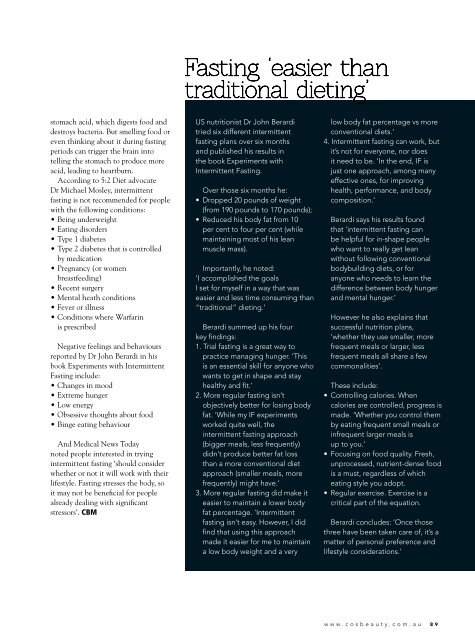CosBeauty Magazine #85
CosBeauty is the #BeautyAddict's guide to lifestyle, health and beauty in Australia. In this issue: - The Breast Report - your guide to augmentation - Put an end to bad hair days - 24 hour makeup, products that last - Sex appeal - do you have it?
CosBeauty is the #BeautyAddict's guide to lifestyle, health and beauty in Australia.
In this issue:
- The Breast Report - your guide to augmentation
- Put an end to bad hair days
- 24 hour makeup, products that last
- Sex appeal - do you have it?
You also want an ePaper? Increase the reach of your titles
YUMPU automatically turns print PDFs into web optimized ePapers that Google loves.
Fasting ‘easier than<br />
traditional dieting’<br />
stomach acid, which digests food and<br />
destroys bacteria. But smelling food or<br />
even thinking about it during fasting<br />
periods can trigger the brain into<br />
telling the stomach to produce more<br />
acid, leading to heartburn.<br />
According to 5:2 Diet advocate<br />
Dr Michael Mosley, intermittent<br />
fasting is not recommended for people<br />
with the following conditions:<br />
• Being underweight<br />
• Eating disorders<br />
• Type 1 diabetes<br />
• Type 2 diabetes that is controlled<br />
by medication<br />
• Pregnancy (or women<br />
breastfeeding)<br />
• Recent surgery<br />
• Mental heath conditions<br />
• Fever or illness<br />
• Conditions where Warfarin<br />
is prescribed<br />
Negative feelings and behaviours<br />
reported by Dr John Berardi in his<br />
book Experiments with Intermittent<br />
Fasting include:<br />
• Changes in mood<br />
• Extreme hunger<br />
• Low energy<br />
• Obsessive thoughts about food<br />
• Binge eating behaviour<br />
And Medical News Today<br />
noted people interested in trying<br />
intermittent fasting ‘should consider<br />
whether or not it will work with their<br />
lifestyle. Fasting stresses the body, so<br />
it may not be beneficial for people<br />
already dealing with significant<br />
stressors’. CBM<br />
US nutritionist Dr John Berardi<br />
tried six different intermittent<br />
fasting plans over six months<br />
and published his results in<br />
the book Experiments with<br />
Intermittent Fasting.<br />
Over those six months he:<br />
• Dropped 20 pounds of weight<br />
(from 190 pounds to 170 pounds);<br />
• Reduced his body fat from 10<br />
per cent to four per cent (while<br />
maintaining most of his lean<br />
muscle mass).<br />
Importantly, he noted:<br />
‘I accomplished the goals<br />
I set for myself in a way that was<br />
easier and less time consuming than<br />
“traditional” dieting.’<br />
Berardi summed up his four<br />
key findings:<br />
1. Trial fasting is a great way to<br />
practice managing hunger. ‘This<br />
is an essential skill for anyone who<br />
wants to get in shape and stay<br />
healthy and fit.’<br />
2. More regular fasting isn’t<br />
objectively better for losing body<br />
fat. ‘While my IF experiments<br />
worked quite well, the<br />
intermittent fasting approach<br />
(bigger meals, less frequently)<br />
didn’t produce better fat loss<br />
than a more conventional diet<br />
approach (smaller meals, more<br />
frequently) might have.’<br />
3. More regular fasting did make it<br />
easier to maintain a lower body<br />
fat percentage. ‘Intermittent<br />
fasting isn’t easy. However, I did<br />
find that using this approach<br />
made it easier for me to maintain<br />
a low body weight and a very<br />
low body fat percentage vs more<br />
conventional diets.’<br />
4. Intermittent fasting can work, but<br />
it’s not for everyone, nor does<br />
it need to be. ‘In the end, IF is<br />
just one approach, among many<br />
effective ones, for improving<br />
health, performance, and body<br />
composition.’<br />
Berardi says his results found<br />
that ‘intermittent fasting can<br />
be helpful for in-shape people<br />
who want to really get lean<br />
without following conventional<br />
bodybuilding diets, or for<br />
anyone who needs to learn the<br />
difference between body hunger<br />
and mental hunger.’<br />
However he also explains that<br />
successful nutrition plans,<br />
‘whether they use smaller, more<br />
frequent meals or larger, less<br />
frequent meals all share a few<br />
commonalities’.<br />
These include:<br />
• Controlling calories. When<br />
calories are controlled, progress is<br />
made. ‘Whether you control them<br />
by eating frequent small meals or<br />
infrequent larger meals is<br />
up to you.’<br />
• Focusing on food quality. Fresh,<br />
unprocessed, nutrient-dense food<br />
is a must, regardless of which<br />
eating style you adopt.<br />
• Regular exercise. Exercise is a<br />
critical part of the equation.<br />
Berardi concludes: ‘Once those<br />
three have been taken care of, it’s a<br />
matter of personal preference and<br />
lifestyle considerations.’<br />
www.cosbeauty.com.au 89


















